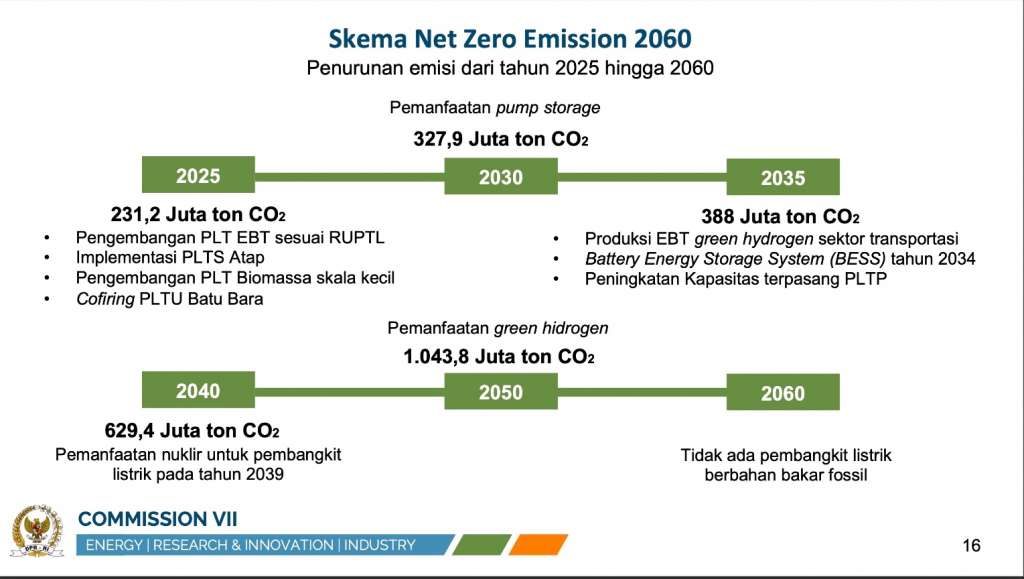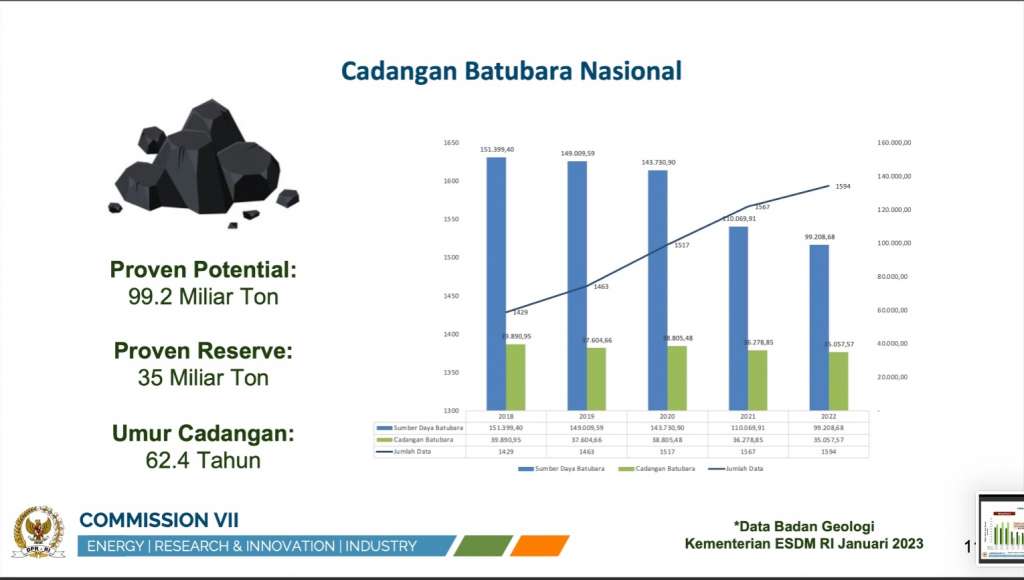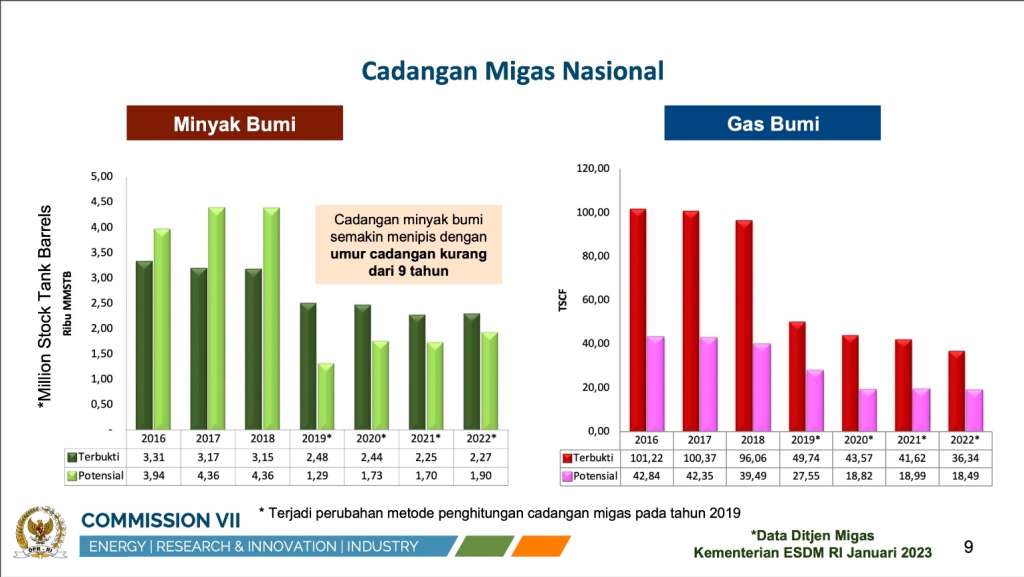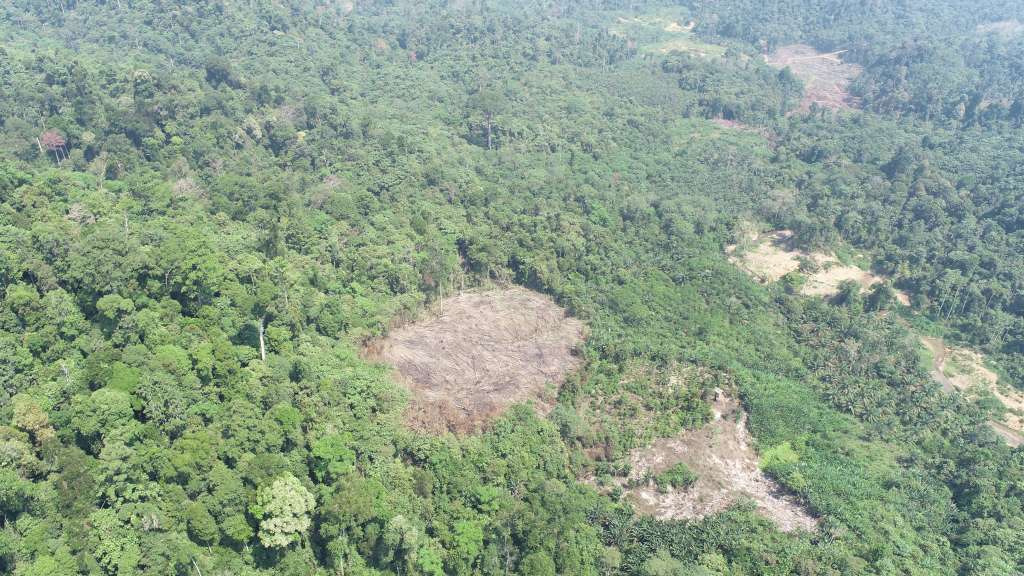
Efforts to reduce emissions by building a resilient national energy system are essentially a challenge in safeguarding natural resources, the environment, and the livelihoods of communities within the nation. On one hand, the demand for energy continues to rise in line with economic and population growth. On the other hand, the use of fossil fuel energy sources, which have long been the primary energy source, has negative impacts on the environment and climate.
The use of fossil energy has damaged Indonesia’s forests and natural environment. Water, sea, air, river, and soil pollution resulting from extensive exploitation are real impacts of operating mining permits. This situation emphasize the urgency of transitioning to more environmentally friendly energy sources that do not harm forests and the environments, specifically by shifting to renewable energy.
The transition efforts are becoming increasingly important considering the dwindling reserves of fossil fuels in Indonesia. The Ministry of Energy and Mineral Resources (ESDM) estimates that the national oil reserves in 2020 will only last for about 9.5 years ahead. Indonesia, ranked 19th in global reserves of oil and natural gas, faces the formidable task in preparing for its energy future.


Furthermore, despites Indonesia owning abundant coal reserves, with Proven Potential reaching 99.2 billion Tons and Proven Reserves of 35 Billion Tons estimated to last for 62.4 years at the current production rate, the use of coal to meet energy needs, especially for power generation, will only result in greenhouse gas emissions contributing to climate change. This indicates that the fossil energy reserves in Indonesia are actually not that extensive and are not a solution to face climate change.
The Energy Trilemma Index is also still low, with a ranking of 56, indicating the need for strong commitments to reduce greenhouse gas emissions from the energy sector. With a target reduction of 385 million tons of CO2, concrete and strategic steps must be taken promptly to achieve this change.
It looks like Indonesia is hesitating in reducing emissions from the energy sector by moving away from fossil fuels, especially coal. Its commitment to energy transition is questioned, as it plans to revise the target for the new renewable energy mix (EBT). The target, which originally should achieve 23% by 2025, will be revised to 17-19%. This change is included in the Draft Government Regulation on National Energy Policy (RPP KEN). Currently, it is estimated that the energy mix achievement is at 12%.
Sugeng Suparwoto, as the Chairman of Commission VII of the Indonesian House of Representatives (DPR RI), has proposed one of the business models currently being considered, which is Carbon Capture and Storage (CCS) and Carbon Capture, Utilization, and Storage (CCUS). This business model aims to reduce greenhouse gas emissions generated from oil and gas production activities by capturing carbon dioxide (CO2) and storing it in underground reservoirs or utilizing it for other purposes. By implementing CCS and CCUS, it is hoped that the environmental impact of the oil and gas industry can be reduced, and the sustainability of this sector can be improved.
The Commission VII of the DPR RI is currently drafting the Draft Law on Oil and Gas (RUU Migas) to support the increase in oil and natural gas (migas) production while considering sustainability aspects.
During the workshop titled “Navigating the Challenges and Opportunities of Energy Transition Post the 2024 Election” organized by the Indonesian Parliamentary Center (IPC) on Tuesday, February 27, 2024, in Jakarta, Sugeng Suparwoto also explained that Commission VII is open to various inputs, especially regarding the Draft Law on New Renewable Energy (EBET) which is likely to be passed in several sessions. “We are open, and this coalition can have hearings at the DPR RI building,” emphasized Sugeng.
Anggi Putra Prayoga, the Campaign, Advocacy, and Media Manager of Forest Watch Indonesia, questions the direction of energy transition navigation led by Commission VII of the DPR RI, which remains unclear. There are also concerns regarding the inclusion of bioenergy in the category of renewable energy in the draft EBET Law. There is doubt regarding the decision-making process on bioenergy as renewable energy, whether the DPR as the proposer of this bill, has gathered enough information or not, such as in assessing the deforestation impacts it may cause. Bioenergy, whether derived from palm oil commodities or wood biomass in the form of wood pellets, is closely related to forests and land. The commodification of natural resources by concessions demands high land demand, which could potentially become a driver of deforestation.

Forest Watch Indonesia’s notes (2023) indicate that the wood biomass targeted to meet the co-firing needs of 52 power plants will be supplied through the development of Energy Plantation Forests (HTE). At least, currently, there are 31 HTE concessions which have already damaged Indonesia’s natural forests by 55 thousand hectares. If the co-firing policy and the use of wood biomass as part of the energy mix and emission reduction efforts continue, it is projected that 4.65 million hectares of natural forest will be deforested instead. “Bioenergy is part of a business that will actually become a new driver of deforestation in the energy transition. The energy transition should abandon fossil fuels, co-firing projects, and the commodification of natural resources,” concluded Anggi.
Arif Adiputro, Coordinator of the Parliamentary Representation Division at the Indonesian Parliamentary Center, emphasizes that civil society needs a platform for information regarding the direction and objectives of energy policies, both in parliament and within the government. IPC, along with other CSO partners, has agreed to not include the concepts of new energy like coal gasification, nuclear, and including co-firing in the legislative process of the EBET Bill. This is because those things hinder the actual energy transition process. Therefore, we consistently advocate for the DPR and the Government to exclude elements of new energy from the EBET Bill.
Conclusion
Reducing emissions from the energy sector or transitioning to clean energy is an urgent necessity for Indonesia. Currently, the direction of navigation taken is still unclear, with continued dependence on coal, co-firing, and bioenergy contributing to deforestation. This raises concerns about the uncertainty regarding emission reduction efforts and the negative environmental impacts.
The use of fossil fuel, especially coal, is resulting in high greenhouse gas emissions and contributes to climate change. Deforestation due to bioenergy is also a serious problem. The government appears to be hesitating in leaving the fossil energy behind. The plans to revise energy mix targets, the use of coal, and co-firing indicate that the government is yet to be fully committed to energy transition.
The government needs to be focused on policies that support energy transition and do not harm the environment. The direction of energy transition navigation should be clear and measurable, with ambitious yet realistic targets. The government should commit to reducing greenhouse gas emissions by discontinuing the use of coal and co-firing, while promoting the development and utilization of sustainable renewable energy. Access to energy that is fair and equal for all members of society must also be ensured.
Civil society must continue to monitor and urge the government to commit to a fair and sustainable energy transition. Energy transition is a collective responsibility to achieve a greener and more sustainable future.
*****
The attachment to the presentation document of the Commission VII of the Indonesian House of Representatives at the workshop titled “Navigating the Challenges and Opportunities of Energy Transition Post-2024 Election” by the Indonesian Parliamentary Center can be downloaded at the following link: National Energy Resilience Challenges by Sugeng Suparwoto, Chairman of Commission VII DPR-RI.



